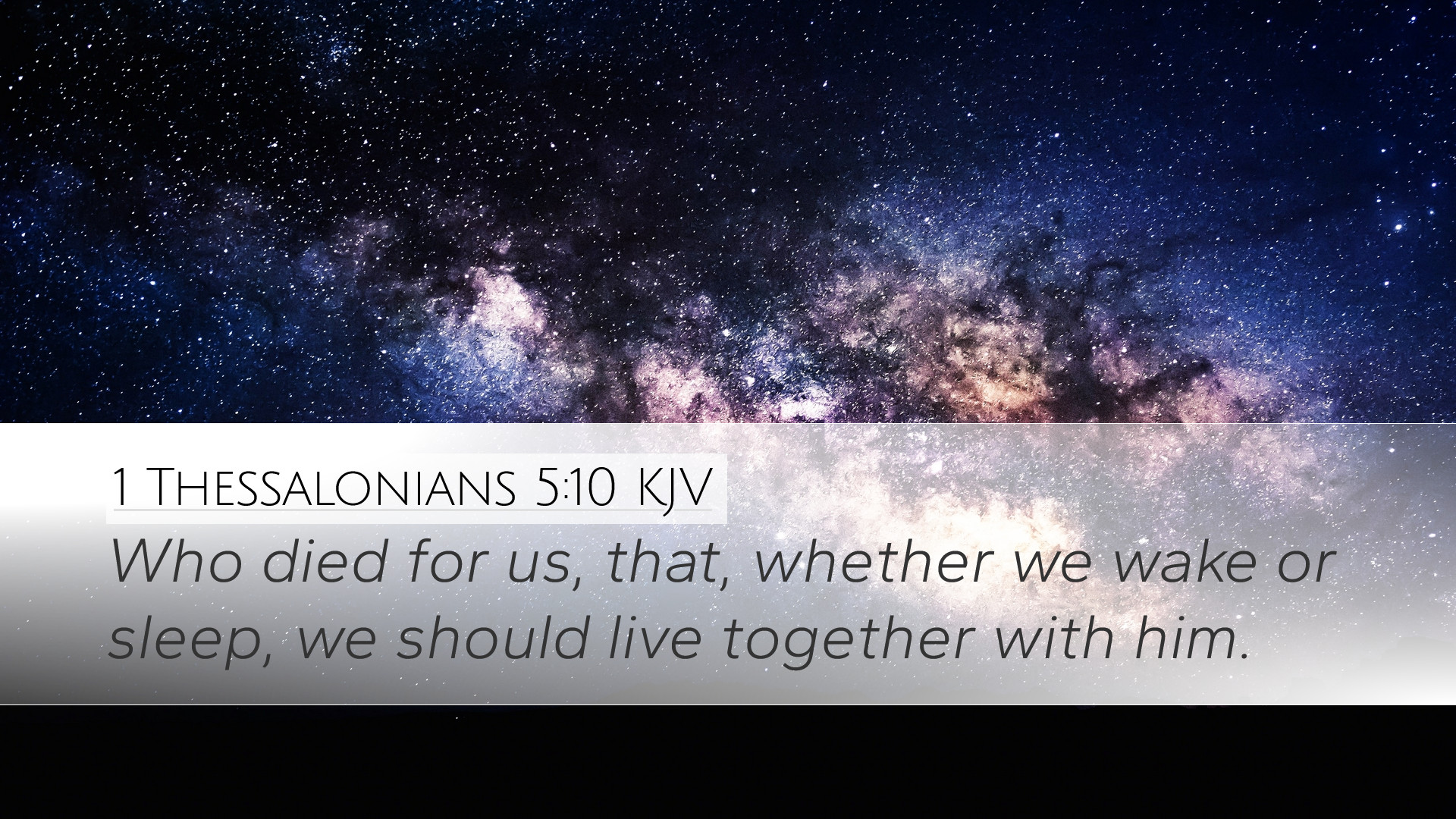Commentary on 1 Thessalonians 5:10
Bible Verse: "Who died for us, that whether we wake or sleep, we should live together with him."
Introduction
The Apostle Paul in this epistle addresses the Thessalonian church, providing critical lessons on hope, community, and the assurance of salvation that comes through Christ. The verse under consideration, 1 Thessalonians 5:10, encapsulates the heart of Christian hope, emphasizing the sacrificial death of Jesus and its implications for believers, regardless of their current state (awake or asleep). The insights gathered from various public domain commentaries offer profound theological reflections as well as practical applicational wisdom for pastors, students, and scholars.
Theological Insights
-
Matthew Henry's Perspective
Matthew Henry emphasizes the centrality of Christ's death in the life of believers. He notes that His death was not merely a historical event but a divine appointment with profound implications for humanity. Henry reflects on the duality of "wake or sleep,” highlighting that both living and deceased believers share in the same divine assurance of eternal life. He articulates that this underscores the comfort believers derive from the hope of resurrection and eternal fellowship with Christ.
Furthermore, Henry discusses the theme of unity among believers, asserting that all Christians—whether they are alive or have passed away—are intrinsically linked in their relationship with Jesus. This unity is a source of great encouragement, reminding believers that they are never alone in their spiritual journey.
-
Albert Barnes' Contribution
Albert Barnes provides a detailed exegesis of the key terms within the verse, particularly the phrases "who died for us" and "we should live together with him." Barnes draws attention to the explicit nature of Christ’s sacrificial atonement, clarifying that His death was not for any particular group, but for all who would embrace faith in Him. He posits that this should instill a sense of security and hope as believers contemplate their standing before God.
Moreover, Barnes delves into the eschatological implications of this verse. The term “whether we wake or sleep” is interpreted within the context of the second coming of Christ. Barnes articulates a strong assurance for both the living and the deceased believers, affirming that all will be resurrected and partake in eternal life. His perspective reinforces the call for Christians to remain vigilant and hopeful as they await the return of the Lord.
-
Adam Clarke's Analysis
Adam Clarke brings a scholarly yet devotional aspect to the verse, focusing on the profound relational aspect of the believer's connection with Christ. He signifies that the phrase "we should live together with him" speaks to the relational dynamics of our faith. Clarke emphasizes that the Christian experience is one of continual communion with Christ, which is both a present reality and a future hope.
Clarke further elaborates on the implications of "sleep" as a metaphor for death, articulating that believers need not fear death as it is merely a transition into a deeper fellowship with Christ. He highlights the importance of maintaining a spiritual wakefulness to remain aware of God's presence and leading in our lives.
Practical Application
The insights gained from these commentaries lead to several key applications for the Christian community:
- Encouragement in Trials: Understanding that Christ died for us provides encouragement during trials and tribulations. Believers can find solace in knowing that their struggles are accompanied by the assurance of Christ’s love and sacrifice.
- Christ-Centered Living: The call to “live together with him” prompts a lifestyle of discipleship and intimacy with Christ. This relationship should manifest in acts of love, service, and community within the church.
- Hope in Mortality: The assurance that whether we wake or sleep, we will be united with Christ is a profound comfort in mourning and loss. This verse invites believers to reflect on the hope of resurrection and eternal life in Christ, fostering a sense of peace during grief.
- Urgency in Evangelism: Recognizing that Christ died for all reinforces the urgency of sharing the gospel. It encourages believers to reach out to those who have not yet experienced the love of Christ, sharing the hope that Jesus brings to both the living and the deceased.
Conclusion
1 Thessalonians 5:10 serves as a powerful reminder of the central tenets of the Christian faith—the sacrificial love of Christ and the promise of eternal life. The insights from commentaries by Matthew Henry, Albert Barnes, and Adam Clarke collectively underscore the multifaceted implications of this verse. For pastors, students, theologians, and Bible scholars alike, the call to live in the light of Christ's death and resurrection inspires not only doctrinal clarity but also practical living that reflects the love of God in an often tumultuous world.


